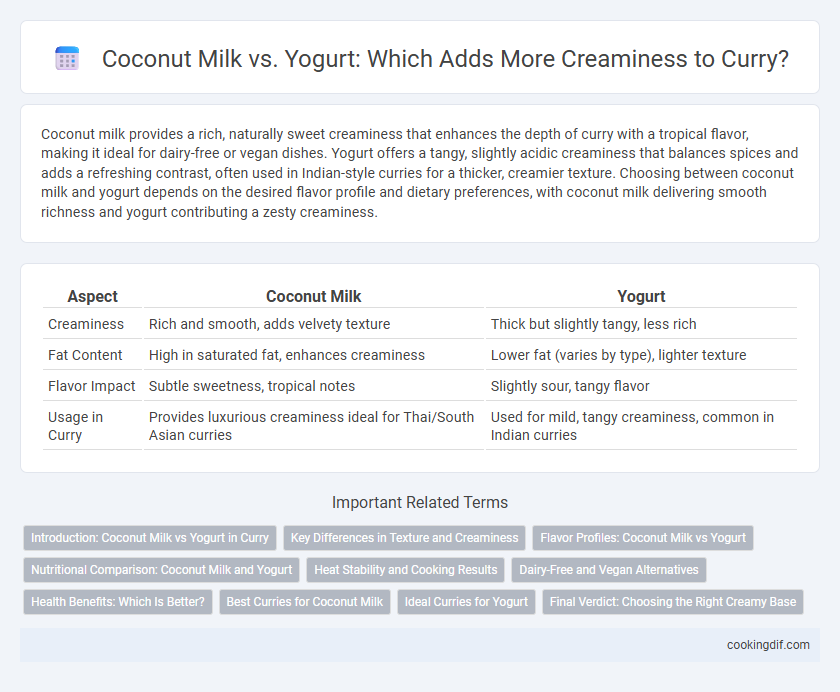Coconut milk provides a rich, naturally sweet creaminess that enhances the depth of curry with a tropical flavor, making it ideal for dairy-free or vegan dishes. Yogurt offers a tangy, slightly acidic creaminess that balances spices and adds a refreshing contrast, often used in Indian-style curries for a thicker, creamier texture. Choosing between coconut milk and yogurt depends on the desired flavor profile and dietary preferences, with coconut milk delivering smooth richness and yogurt contributing a zesty creaminess.
Table of Comparison
| Aspect | Coconut Milk | Yogurt |
|---|---|---|
| Creaminess | Rich and smooth, adds velvety texture | Thick but slightly tangy, less rich |
| Fat Content | High in saturated fat, enhances creaminess | Lower fat (varies by type), lighter texture |
| Flavor Impact | Subtle sweetness, tropical notes | Slightly sour, tangy flavor |
| Usage in Curry | Provides luxurious creaminess ideal for Thai/South Asian curries | Used for mild, tangy creaminess, common in Indian curries |
Introduction: Coconut Milk vs Yogurt in Curry
Coconut milk provides a rich, naturally sweet creaminess that enhances the flavor profile of curry with its tropical undertones and smooth texture. Yogurt adds a tangy, fermented creaminess that balances spicy heat and offers a probiotic boost while slightly thinning the sauce. Both ingredients contribute distinct creamy textures, with coconut milk favored in South Indian and Thai curries, and yogurt commonly used in North Indian and Middle Eastern curry recipes.
Key Differences in Texture and Creaminess
Coconut milk delivers a rich, velvety texture with a natural sweetness that enhances the creaminess of curry, making it ideal for dairy-free options. Yogurt provides a tangy, thicker consistency that adds a slightly acidic creaminess while tenderizing ingredients during cooking. The key difference lies in coconut milk's smooth, fatty creaminess versus yogurt's probiotic-rich, thicker texture that can curdle if overheated.
Flavor Profiles: Coconut Milk vs Yogurt
Coconut milk imparts a rich, sweet, and slightly nutty flavor that enhances the tropical and aromatic qualities of curry dishes. Yogurt contributes a tangy, mildly acidic profile that adds brightness and depth, balancing spicy and savory notes in the curry. Choosing coconut milk or yogurt significantly influences the final flavor complexity and texture, tailoring the curry's taste to either creamy sweetness or zesty creaminess.
Nutritional Comparison: Coconut Milk and Yogurt
Coconut milk and yogurt both enhance curry creaminess but differ nutritionally; coconut milk is rich in medium-chain triglycerides (MCTs) and saturated fats, providing a dairy-free option with higher calories and healthy fats. Yogurt offers probiotics, calcium, and higher protein content, supporting digestion and muscle health while contributing to a tangy flavor. Choosing between the two depends on dietary needs, with coconut milk suitable for vegan diets and yogurt benefiting those seeking gut health and additional nutrients.
Heat Stability and Cooking Results
Coconut milk offers superior heat stability compared to yogurt, maintaining its creamy texture without curdling during prolonged cooking or high-heat applications in curries. Yogurt, while rich in probiotics and tangy flavor, tends to separate or curdle when exposed to direct heat, especially if not tempered properly. Using coconut milk ensures a smooth, consistent creaminess in curries, enhancing both texture and flavor without compromising cooking results.
Dairy-Free and Vegan Alternatives
Coconut milk offers rich, natural creaminess and a subtle sweetness, making it a popular dairy-free, vegan alternative in curries that enhances depth without compromising flavor. Unlike yogurt, which provides tanginess and probiotics but may contain dairy unless plant-based, coconut milk maintains a smooth texture ideal for those avoiding animal products. For vegan curries, coconut milk ensures a creamy consistency without dairy allergens, elevating the dish's richness while aligning with dietary restrictions.
Health Benefits: Which Is Better?
Coconut milk provides a rich source of medium-chain triglycerides (MCTs) that promote brain health and boost metabolism, making it a popular choice for creamy curries with heart-healthy fats. Yogurt contains probiotics that enhance gut health and improve digestion, along with calcium and protein essential for bone strength and muscle repair. Choosing between coconut milk and yogurt depends on dietary goals, with coconut milk suitable for dairy-free diets and yogurt offering gut-friendly nutrients and higher protein content.
Best Curries for Coconut Milk
Coconut milk provides a rich, velvety creaminess ideal for Thai and South Indian curries such as Thai Green Curry and Kerala Fish Curry, enhancing their authentic flavors with natural sweetness and a smooth texture. Yogurt adds tanginess and a lighter creaminess perfect for North Indian dishes like Chicken Korma and Tikka Masala but lacks the tropical richness of coconut milk. Curries featuring coconut milk stand out for their luxurious mouthfeel and the ability to balance spicy and savory ingredients seamlessly.
Ideal Curries for Yogurt
Yogurt provides a tangy creaminess ideal for Indian curries like Chicken Tikka Masala and Saag Paneer, enhancing their rich, spiced flavors while maintaining a smooth texture. Unlike coconut milk, yogurt adds a slight acidity that balances the heat and depth of aromatics in traditional North Indian and Punjabi dishes. Its probiotic content also aids digestion, making yogurt a preferred creamy base for yogurt-based curries such as Kadhi and Navratan Korma.
Final Verdict: Choosing the Right Creamy Base
Coconut milk provides a rich, naturally sweet creaminess ideal for Thai and South Indian curries, while yogurt offers a tangy, probiotic-rich alternative that thickens and balances spices in North Indian dishes. For lactose-intolerant or vegan diets, coconut milk is a suitable creamy base, whereas yogurt enhances flavor complexity and adds a nutritional probiotic boost. Selecting the right creamy base depends on the desired flavor profile, dietary restrictions, and regional authenticity of the curry.
Coconut milk vs yogurt for creaminess Infographic

 cookingdif.com
cookingdif.com